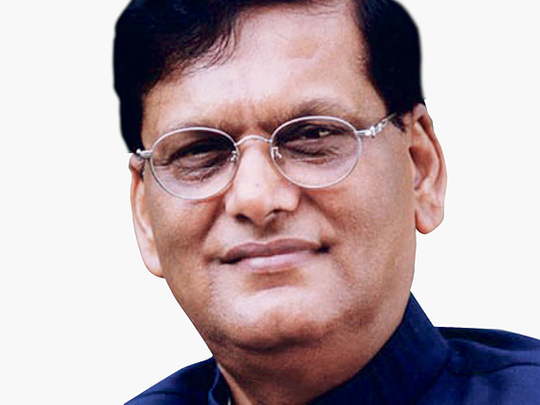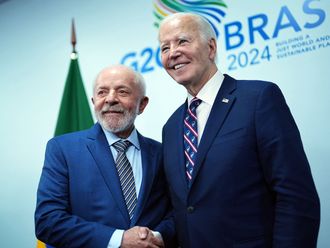
New Delhi: Environment, the buzzword now, was understood by Dr Bindeshwar Pathak in the early 1970s when he launched Sulabh International. He made innovative use of biogas technology by linking Sulabh toilets to fermentation plants, which have become the byword for sanitation in developing countries.
A distinctive feature of Pathak's project is its odour-free biogas production. And releases clean water rich in phosphorous and other ingredients that are important constituents of organic manure. His sanitation movement ensures cleanliness and prevents greenhouse gas emission that is polluting environment the world over.
Pathak speaks to Gulf News in an exclusive interview.
GULF NEWS: Considering the effects of climate change, you seem to be one of the first who practised water conservation and biotechnology. Would you call it thinking way ahead of times?
BINDESHWAR PATHAK: The two technologies [one for individual houses and the other for public places] developed by us are major contributions towards environmental protection. Unlike in septic tank technology, where at least 65 per cent methane gas goes into the air, in our two-pit system, the gases are burnt and absorbed in the soil, so there is no question of gas escaping to the atmosphere.
The other technology is the biogas digester with effluent treatment plant. Biogas can be used for cooking, lighting and electricity generation. Earlier, we used 20 per cent diesel, but now it is 100 per cent biogas, as battery operations have replaced diesel. Also, since water discharged from the toilets through biogas digester is treated through sand filters, charcoal and ultra-violet rays, it becomes purified and is fit for irrigation purposes.
In both technologies we get biofertiliser to use in the fields.
With all the technical know-how acquired over the last many years, do you have any suggestions for cleaning up Ganges and Yamuna rivers?
If a treatment plant of a bigger size using our technology is set up at the end point of a drain or sewage line — from where it goes into the river — the water will be treated there itself. And what goes into the river will be free of pollution. It requires little research and development, as this technology is perfected.
Have you ever discussed the rivers issue with the Environment Ministry or the chief minister of Delhi?
I met Chief Minister Sheila Dikshit last year and discussed the issue. The Environment Ministry is also aware of us. But my experience is that if you approach people on your own, their attitude is very different. They think you have some vested interest. Recently, Prime Minister of Sweden John Fredrik Reinfeldt and United States Ambassador Timothy Roemer came to visit us on their own. Surely, if they know about Sulabh, people sitting in Delhi cannot be unaware of us.
Your comments on Environment Minister Jairam Ramesh's remark that if there was a Nobel for filth India would surely win.
Wanting to see the country clean, the minister must have said this in frustration. The anger brewing inside him must have come to the fore. No doubt, his intention is good but the remarks should be restrained.
More than two decades on, how does it feel having set up the first biogas plant in Patna in 1982? Where have you reached since then?
In India, the first sewer line was laid in Kolkata in 1870. After 140 years, out of 5,161 towns, only 232 towns have sewer lines and that too partially. This is the depth of slowness in the system. In London, the first sewer was laid in London in 1850 and in New York in 1860, but they have surpassed us.
What is the reason for this slackness in India?
It is all because the technologies applied are very costly and India cannot afford them. In lieu of these, Sulabh technology, which is both cost effective and environment-friendly, was introduced. Today, it is a boon.
Do you believe in the old Indian saying that if you want to know the actual living standard of a family, check out their toilet and kitchen?
Of course, these are the trademarks of a civilised person. I find several restaurants with beautiful ambience that serve good food in pleasing environs, but their washrooms are filthy. And I make it a point to tell them that! Once Mahatma Gandhi was invited to inaugurate a hospital in Jaipur, but before doing that, he insisted on checking out the toilet. Much to the embarrassment of the hospital authorities, the toilet was not well maintained. Gandhi asked them to first have the place cleaned up properly and only then would he do the inauguration. I feel that after the Independence movement, India now needs a second movement — this one against dirt and filth.
You were in Japan recently. Was it to impart Sulabh technology to the Japanese?
During the International Year of Sanitation in 2008, the UN body, in collaboration with the Japanese government, organised a conference in Japan to find the technologies that could help achieve the Millennium Development Goals. Sulabh was among the 15 institutions invited then. Being in Japan was an eye-opening experience. We always thought that a developed country like Japan would have already solved all its sanitation problems, but found that it was incorrect. We now have plans to set up some Sulabh toilets in Japan at our own cost and see how things develop and take shape.
What's the reason that in India issues related to sanitation are not as recognised as environmental issues, pollution of the ozone layer, or felling of trees?
At one time, sanitation problem had existed everywhere in the world. But by the 20th century, the Europeans and the Americans put up sewerage systems on a large scale and solved their problems. Since the problem of sanitation is now history to them, they are unable to even understand why we are still struggling with it. Whereas, unlike sanitation, global warming and other issues related to it are affecting the entire world and hence are much talked about. But then Indians have themselves given very low-priority to sanitation.
Were there any teething troubles when you set up the organisation?
Before I founded Sulabh in 1970, I also applied for a grant of $1000 (Dh3,670) from the Bihar government. The amount was sanctioned, but the government fell and the funds got stuck. My documents, meanwhile, reached an Indian Administrative Officer, Rameshwar Nath, who asked me to meet him. On seeing me he laughed, because he had thought he would be meeting an old man who followed Gandhian philosophy. He told me then that my programme would make an impact in the country, but it was fraught with danger regarding funds.
The officer advised me that I should not treat that money as grant and instead use it for implementation of the programme. In addition, he counselled me to also look after the maintenance work, be ethical and moralistic in the delivery system and never misuse funds. Incidentally, the finances did not come about even then.
But this was the beginning of the idea of not taking any government grant and running an organisation. Initially, times were difficult. To make ends meet, I had to sell our ancestral land, my wife's jewellery and even borrow from friends. Eventually, things moved in 1973 when a government official gave me Rs250 (Dh20) to construct two toilets in Bihar.
Many wonder how Sulabh operates all over the country. Since you do not get any financial aid from the government, how do you manage your funds?
I am glad you asked me this question, as off and on, despite the good work, we get to hear some negative views. Presently, we have 7,500 toilets in India and get social funding from three sources. One, from construction of individual and public toilets, wherein we charge a 20 per cent overhead on each construction, which includes its designing, training and implementation. Second, maintenance of individual toilets for five years and public toilets for 30 years. Third, we sweep and clean some government buildings and hospitals including the North Block, the South Block and the All India Institute of Medical Sciences. The advantage is absolute non-interference from the government. But the limitation is we have not been able to expand internationally, as we would have liked.
Profile: Growth from grassroots
• Dr Bindeshwar Pathak was born on April 2, 1943 in Rampur, Bihar.
• Graduated in Sociology - 1964.
• Earned his master's degree in Sociology and English and a Ph.D.
• Was entrusted with a job during Gandhi centenary celebrations in Patna, Bihar - 1969.
• Founded the social service organisation Sulabh International — 1970 that works to promote human rights, environmental sanitation, non-conventional energy and waste management.
• Padma Bhushan award conferred upon him by the Government of India - 1991.
• The Dubai International Award for Best Practices — 2000.
• Energy Globe Award - 2007.
• Stockholm Water Prize — 2009.












